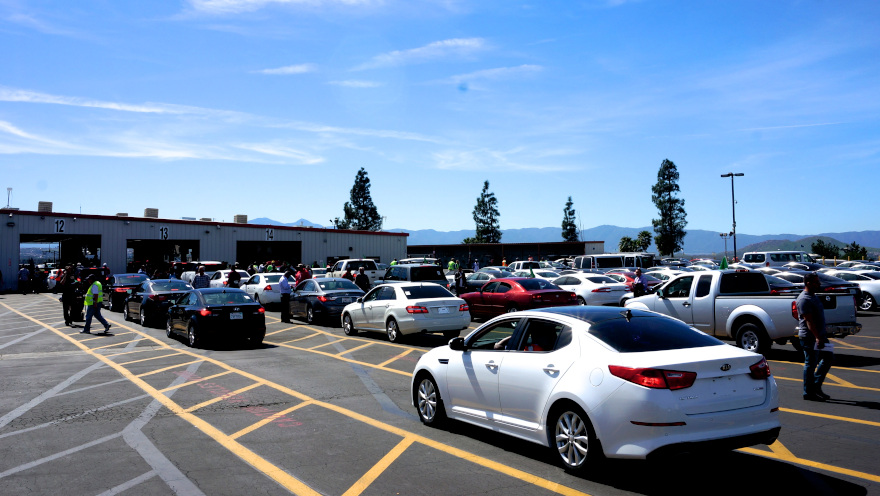Amid supply crunch, wholesale vehicle prices surge to record

File photo of vehicles lined up at a Manheim auction in California. Photo courtesy of company.
By subscribing, you agree to receive communications from Auto Remarketing and our partners in accordance with our Privacy Policy. We may share your information with select partners and sponsors who may contact you about their products and services. You may unsubscribe at any time.
CARY, N.C. –
Cox Automotive’s measure of wholesale vehicle prices reached a new all-time high in September, passing the record set in the spring and defying prior expectations amid continuing car supply challenges driven by multiple macro factors.
Specifically, the Manheim Used Vehicle Value Index came in at 204.8 last month, which beats the year-ago reading by 27.1%. Wholesale prices were also up 5.3% month-over-month.
And it wasn't the only measure of wholesale vehicle prices to set a record in September. The Black Book Used Vehicle Retention Index was at an all-time high of 169.5, a 2.3% month-over-month increase and a 29.6% hike from September 2020.
“With new inventory levels continuing to drop, dealers are increasing their spending on used inventory, pushing wholesale prices up across all segments in September,” Black Book chief data science officer Alex Yurchenko said in a news release.
“Cars of all sizes and vans saw exceptionally strong increases. With anticipated limited new vehicle supply (and low incentives) for months to come and lower than typical return volume from rental and commercial fleet companies, we expect the wholesale prices to remain strong throughout Q4,” Yurchenko said
As for Manheim's index, the prior record was set in May, which capped a string of four straight all-time highs as the index reached 203.0 and passed the 200 mark for the first time. It then continued to climb in the first half of June, reaching 203.6 by the middle of the month.
Subscribe to Auto Remarketing to stay informed and stay ahead.
By subscribing, you agree to receive communications from Auto Remarketing and our partners in accordance with our Privacy Policy. We may share your information with select partners and sponsors who may contact you about their products and services. You may unsubscribe at any time.
Wholesale prices then slowed in the back half of June, with the index dipping to 200.4 to close the month, followed by drops to 195.2 in July and 194.5 in August.
As the index reached its record heights in late spring, “we believed that numbers in the 200s would be behind us for some time,” Cox Automotive chief economist Jonathan Smoke said in a news release.
“However, the new-vehicle production problem worsened instead of getting better in Q3. Used inventory issues were further exacerbated by damage to vehicles caused by Hurricane Ida in late August, putting pressure on an already historically tight market and driving the MUVVI up to a record of 204.8,” Smoke said.
Drilling down into those inventory numbers, supply was at 18 days in the wholesale market to end September, compared to the normal level of 23 and the April 9, 2020 peak of 149, according to Cox Automotive.
In an in-depth quarterly report on the index and other market trends, Cox Automotive indicated that supply from commercial consignors is not even half of what it was before COVID-19.
Off-lease check-ins are approximately 15% of normal levels, as “extremely high equity positions” means those cars are not being turned over to the auction lanes, the report shows.
With vehicle repossession rates at near-record lows, the repo check-ins are approximately two-thirds of what they normally are, Cox said.
Meantime, rental check-ins are roughly 40% of normal rates. With less replacement volume available to rental fleets on the new-car side, they are not de-fleeting as much.
Cox Automotive is projecting total wholesale volumes of 13.6 million units for full-year 2021. That’s after wholesale volumes fell from 15.0 million in 2019 to 13.5 million in 2020.
It is forecasting a slight rise in volume to 13.9 million next year, followed by a decline back to 13.6 million in 2023 before another uptick to 14.2 million in 2024.
On the retail side of the market, used-car supply was at 37 days to end September, compared to the normal supply of 44 days and the April 8, 2020 peak of 114 days.
That said, Cox Automotive said in its Q3 Manheim Used Vehicle Value Index presentation that while used retail supply is still limited, the actual decline has stopped. In fact, a chart accompanying the data shows it moving upward recently.
Nick Zulovich contributed to this report.


